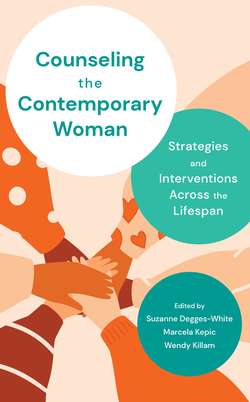Читать книгу Counseling the Contemporary Woman - Suzanne Degges-White - Страница 118
На сайте Литреса книга снята с продажи.
Intrapersonal Concerns
ОглавлениеThe arrivals of perimenopause and, subsequently, menopause affect each woman in an individual and unique manner. Some women actually welcome the transition and perceive it as freedom from concerns about reproductive health. They are relieved to leave behind concerns about unplanned pregnancy and the hassles related to monthly menstruation. They may be grateful for the newly experienced “invisibility” that is typical of this new life stage. Being removed from the “sexual gaze” in the professional arena, due to their graying hair and aging bodies, can be perceived as an opportunity to be taken more seriously on the job (Isopahkala-Bouret, 2017). When working with clients in midlife, it is important to remember that each client will have a unique experience and attitude regarding this period of development. Encourage clients to express their feelings or beliefs about aging and validate their viewpoints while also encouraging them to expand their perspectives, if necessary, to enlarge their views of what is possible.
There’s an old saying that the older you get, the more like yourself you become. As Jung (1971) suggested, midlife is a time when individuals begin to own traits and characteristics that might not be as pleasing to others as the ones women tend to display throughout the first half of their lives. When coupled with the hormonal changes of midlife, midlife women may feel like they have been unfettered from societal expectations and feel more free to express themselves more authentically with their families, their friends, and their colleagues.
Most people find themselves formally or informally taking stock of their lives at some point during the midlife years, and they also begin to assess whether they are making headway or have become “stuck” (Erikson, 1968). The desire to stay vital and involved can encourage midlife women to become mentors for younger colleagues, volunteer in their communities, become patrons of good causes, and become advocates for others. There is much mention of “menopause zest” in online communities, and this references the motivation that many women feel to stay active and engaged in the world around them—especially if their primary roles in the home or workplace have lost their centrality or power. Transitions, whether unexpected or normative, can cause stress, but transitions also provide opportunities for new beginnings.
